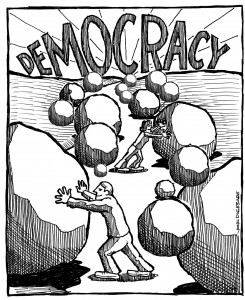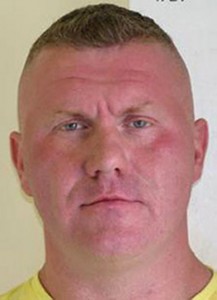Columns
Columns, Devil's Advocate, Politics - Thursday, August 19, 2010 23:50 - 6 Comments
Devil’s Advocate: On the right to offend

Is there a right not to be offended? If so, what about the right to offend? In particular, are some Muslims simply conflating being justifiably criticised with being illegally abused? Omer Ali, Ceasefire's very own Devil's Advocate, ruminates on the matter...
Columns, Diary of a Domestic Extremist - Thursday, August 19, 2010 11:38 - 10 Comments
Diary of a Domestic Extremist – The EDL: Street fighting for the establishment
 The last 18 months has seen the meteroic rise of the EDL. In two weeks, they are planning to organise a protest in Bradford, their 'Big One'. In his new piece, Mikhail Goldman provides a powerful analysis of the socio-political reasons behind the popularity of the EDL and provides a few pointers as to how the response to it should be; puncturing, in the process, a number of myths and illusions that are harboured by both EDL supporters and their opponents.
The last 18 months has seen the meteroic rise of the EDL. In two weeks, they are planning to organise a protest in Bradford, their 'Big One'. In his new piece, Mikhail Goldman provides a powerful analysis of the socio-political reasons behind the popularity of the EDL and provides a few pointers as to how the response to it should be; puncturing, in the process, a number of myths and illusions that are harboured by both EDL supporters and their opponents.
Columns, Modern Times - Tuesday, August 17, 2010 11:02 - 14 Comments
Modern Times: Confessions of an ex-racist
 Are you a racist? no? what makes you so sure? to put it differently, what would you do if you discovered that your attitudes to other people contained, in fact, elements of racism? How would you deal with such a revelation? Corin Faife thought his attitude to race was unblemished, then he took a test...
Are you a racist? no? what makes you so sure? to put it differently, what would you do if you discovered that your attitudes to other people contained, in fact, elements of racism? How would you deal with such a revelation? Corin Faife thought his attitude to race was unblemished, then he took a test...
Columns, Features, Ideas, In Theory - Friday, August 13, 2010 13:30 - 4 Comments
In Theory We come in peace – shoot to kill: On the perils of peacekeeping
The creation of the UN, sixty years ago, has introduced the concept of "international peacekeeping" into the public lexicon. The UN peacekeeping missions are now regular features of news bulletins from conflict zones. And yet, both in its theoretical underpinnings and its practical manifestations, peacekeeping remains a highly problematic idea. Political theorist Andrew Robinson presents the many issues surrounding the idea of peacekeeping, and conducts an impassioned and lucid analysis of how peacekeeping efforts often get things wrong, and what needs to be done to set them right.Columns, Diary of a Domestic Extremist - Thursday, August 12, 2010 13:53 - 5 Comments
Diary of a Domestic Extremist: When legal means are not enough
 The recent bankruptcy of the Refugee and Migrant Justice (RMJ) charity has left thousands of asylum seekers stuck in hopelessness and despair, leading at least one of them, Rasul Osman, to take his own life. This is the latest in a series of attempts by the previous government and the current coalition to make it harder than ever for those seeking a safe haven from torture and violence to do so in dignity and respect. Mikhail Goldman explains the impact created by recent changes to the legal aid system and the catstrophic consequences on the lives of the vulnerable. He also sends out a clear message: when the law fails those it is supposed to protect, only human solidarity and a common determination can make a difference.
The recent bankruptcy of the Refugee and Migrant Justice (RMJ) charity has left thousands of asylum seekers stuck in hopelessness and despair, leading at least one of them, Rasul Osman, to take his own life. This is the latest in a series of attempts by the previous government and the current coalition to make it harder than ever for those seeking a safe haven from torture and violence to do so in dignity and respect. Mikhail Goldman explains the impact created by recent changes to the legal aid system and the catstrophic consequences on the lives of the vulnerable. He also sends out a clear message: when the law fails those it is supposed to protect, only human solidarity and a common determination can make a difference.
Columns, Modern Times - Tuesday, August 10, 2010 13:39 - 10 Comments
Modern Times: Meet the Amish
 Idiosyncratic, quixotic, or just plain sinister? the Amish community has been, almost since its inception, the butt of jokes and the subject of fascination tinged with hostility from the mainstream. And yet, considering the giant spiritual malaise afflicting the west of the twenty first century, doesn't the frequent smugness towards the Amish seem rather misplaced? A recent Channel 4 programme makes Corin Faife consider what the Amish philosophy of life can teach us about the modern world, and ourselves.
Idiosyncratic, quixotic, or just plain sinister? the Amish community has been, almost since its inception, the butt of jokes and the subject of fascination tinged with hostility from the mainstream. And yet, considering the giant spiritual malaise afflicting the west of the twenty first century, doesn't the frequent smugness towards the Amish seem rather misplaced? A recent Channel 4 programme makes Corin Faife consider what the Amish philosophy of life can teach us about the modern world, and ourselves.
Columns, Ideas, In Theory - Friday, August 6, 2010 15:53 - 9 Comments
In Theory Anarchism, war and the state
 Of the many movements and "isms" that have emerged in the past two centuries, none have had the run of stigma, mischaracterisation and sheer venom thrown at it as has the idea of Anarchism. Some use the term as shorthand for political violence, others for nihilistic rejection of societal coherence. Even those who admire its general principles often find themselves in conflict over how those principles are to manifest themselves in the world of reality. In a brilliant and thorough tour d'horizon, Ceasefire columnist Andrew Robinson looks at the development of the Anarchist response to war and the state. He uncovers some striking affinities as well as the nuances in difference within this widely variant (and much maligned) field of thought and offers a neat encapsulation of the major strands involved
Of the many movements and "isms" that have emerged in the past two centuries, none have had the run of stigma, mischaracterisation and sheer venom thrown at it as has the idea of Anarchism. Some use the term as shorthand for political violence, others for nihilistic rejection of societal coherence. Even those who admire its general principles often find themselves in conflict over how those principles are to manifest themselves in the world of reality. In a brilliant and thorough tour d'horizon, Ceasefire columnist Andrew Robinson looks at the development of the Anarchist response to war and the state. He uncovers some striking affinities as well as the nuances in difference within this widely variant (and much maligned) field of thought and offers a neat encapsulation of the major strands involved
Columns, Devil's Advocate, Ideas, Politics - Thursday, August 5, 2010 14:02 - 9 Comments
Devil’s Advocate: Is Democracy overrated?
 Everyone knows -or at least pays lip-service to- Democracy as an exalted ideal. Is everyone wrong? Is this a concept we have been too lazy, or too blind, to fully examine? what is so special about a system that is aimed at creating a good society yet rarely delivers on that promise? In a controversial piece, the first of his 'Devil's Advocate' columns, Omer Ali examines the impact of democracy as well as its theoretical underpinnings. In the process, he draws on examples from politics and economics and takes aim at a few sacred truths.
Everyone knows -or at least pays lip-service to- Democracy as an exalted ideal. Is everyone wrong? Is this a concept we have been too lazy, or too blind, to fully examine? what is so special about a system that is aimed at creating a good society yet rarely delivers on that promise? In a controversial piece, the first of his 'Devil's Advocate' columns, Omer Ali examines the impact of democracy as well as its theoretical underpinnings. In the process, he draws on examples from politics and economics and takes aim at a few sacred truths.
Columns, Modern Times, Politics, Profiles - Tuesday, August 3, 2010 10:57 - 6 Comments
Modern Times: Osman Rasul – In Memory
 On Sunday, Osman Rasul, a 27-year old Iraqi Kurd who had spent nine years in the inhumane limbo of the asylum bureaucracy leaped to his death from the seventh floor of a Nottingham tower block. Ceasefire Columnist Corin Faife, a friend of Osman's, pays tribute to a "warm, kind, respectful man", crushed by the injustice and cruelty of the Home Office's asylum policy.
On Sunday, Osman Rasul, a 27-year old Iraqi Kurd who had spent nine years in the inhumane limbo of the asylum bureaucracy leaped to his death from the seventh floor of a Nottingham tower block. Ceasefire Columnist Corin Faife, a friend of Osman's, pays tribute to a "warm, kind, respectful man", crushed by the injustice and cruelty of the Home Office's asylum policy.
Modern Times - Tuesday, July 20, 2010 16:55 - 3 Comments
Modern Times: Raoul Moat
 “Society creates its own monsters”. So runs, at the time of writing, one of the more intelligent comments posted on the wall of the new Raoul Moat fan page, in stark contrast to the innumerable lines of vitriolic flaming, poor punctuation, ad hominem arguments and flagrant OVERUSE OF CAPS LOCK. Corin Faife takes a look at what the Raoul Moat story, and our collective reaction to it, tell us about the way we live, and think, today.
“Society creates its own monsters”. So runs, at the time of writing, one of the more intelligent comments posted on the wall of the new Raoul Moat fan page, in stark contrast to the innumerable lines of vitriolic flaming, poor punctuation, ad hominem arguments and flagrant OVERUSE OF CAPS LOCK. Corin Faife takes a look at what the Raoul Moat story, and our collective reaction to it, tell us about the way we live, and think, today.

